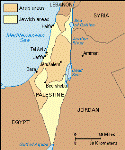Crisis to have little impact on Palestinians
 Ramallah - The world financial crisis is not expected to leave much of an impact on the emerging Palestinian economy, officials, business executives and economists agree.
Ramallah - The world financial crisis is not expected to leave much of an impact on the emerging Palestinian economy, officials, business executives and economists agree.
They said during a luncheon to discuss the world economic crisis that due to the small size of the emerging Palestinian economy, the world financial crisis is not expected to leave any permanent or even short term scar on it.
The luncheon was hosted by the Palestinian cellular telephone company Jawal and its mother company Palestine Telecommunications Group (Paltel), which together contribute to more than 30 per cent of the Palestinian economic activity.
Minister of Planning Samir Abdullah said that while the financial crisis was not going to have any serious impact, it could leave a small dent on three sectors of the economy: trade, remittances from expatriates, and international aid.
Since the Palestinian trade is mainly tied to Israel, the impact of the financial crisis on Israel is bound to impact the Palestinian trade sector, he said.
An economic recession in Israel, which some have forecast as a result of the financial crisis, would also create an economic recession in the Palestinian areas, he said.
Palestinians also rely on remittances from relatives living and working in the Gulf states, the United States or Europe. When these people lose their jobs or income, they are likely to stop sending money to relatives in the Palestinian areas or to invest here.
In addition, the Palestinian Authority (PA) also depends heavily on international aid, which this year was pledged at 1.8 billion dollars, said Abdullah. The PA has already received 1.4 billion dollars of that, 50 per cent of which went to support the budget, and the rest was expected before the end of the year.
He said that while the pledges made at the Paris donors conference held late last year and which amounted to 3.7 billion dollars for the next three years were not expected to change, the PA may find it difficult to ask for more money in the future if the donor countries were going to shift their financial power to saving their economies.
"We think that there will be an impact, but it will be marginal and it will not be difficult to overcome it," Abdullah said.
He said the Palestinians should take advantage of the crisis and move from investing in unstable foreign markets in a bid for a quick profit to investing in the local economy, particularly industry, agriculture and services.
Basem Khouri, who heads a Palestinian private sector coordinating organization, said the most impact will be on the local banks granting loans to private sector businesses.
The banks operating in the Palestinian areas, which already uphold a relatively conservative lending policy, put a limit on the loans not exceeding 30 per cent of their deposits. He thought that the banks will not even reach this limit in the near future.
Khouri, who runs Pharmacare pharmaceutical company from Ramallah which had recently exported the first Palestinian shipment of locally made medicine to Germany, warned that a recession is bound to reduce PA tax collection, in turn directly affecting government performance.
Abdul Malik Jaber, chief executive officer of Paltel Group, called on the Palestinian government to both guarantee deposits of small investors in Palestinian banks and create a fund of guarantees for the financial market.
However, Jamal Tawil, mayor of al-Bireh, a city attached to Ramallah and who belongs to the Islamic movement Hamas, called for a more radical approach to dealing with the world economic crisis.
Tawil, who was recently released from Israeli jails after spending more than five years in prison on political charges and who was elected mayor while he was imprisoned, said Palestinians should adopt what he referred to as a "resistance" and an "Islamic" economy.
Since dependence on Israel and the world would put the Palestinian economy at risk, Palestinians should reduce this dependence and rely more on their own production skills and home economy, he argued.
"A resistance economy would create a big challenge for the Palestinians and increase their steadfastness," he said, adding that this "will change us from people living on the culture of consumption to the culture of economics." (dpa)